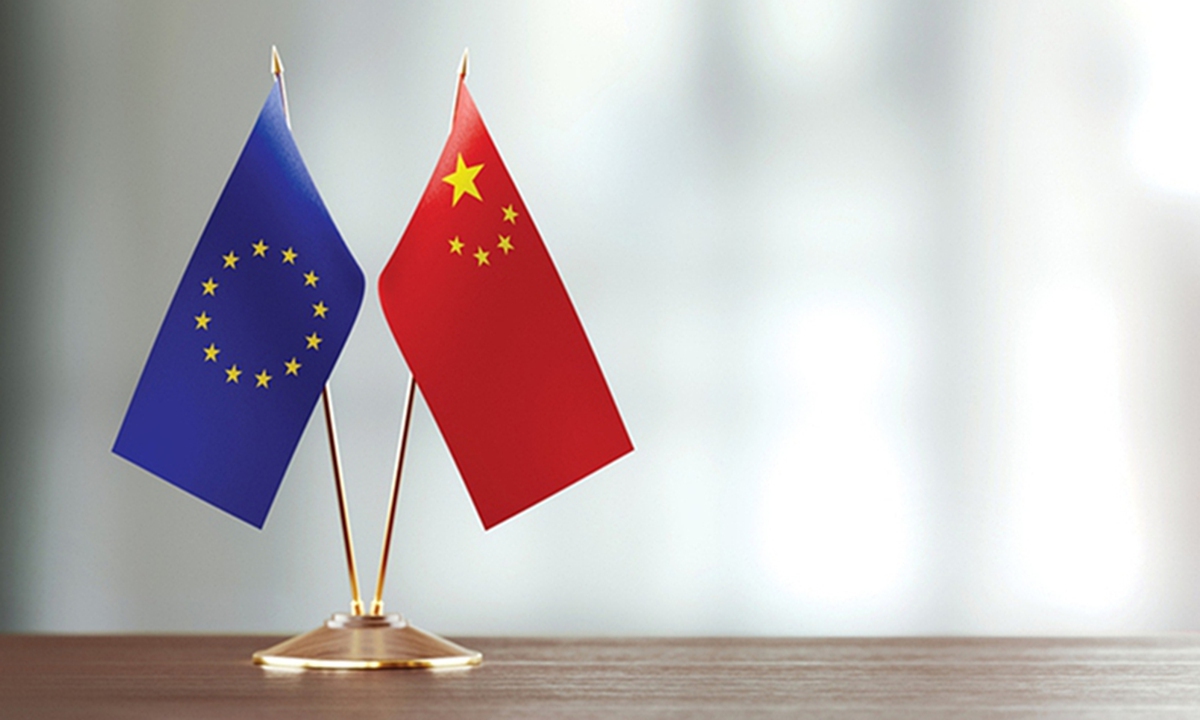EU raid on Chinese company’s offices ‘shocking,’ to undermine European business environment: chamber

China-EU Photo: VCG
Without prior notice, enforcement agencies authorized by the European Commission conducted raids at an unidentified Chinese company’s offices in Poland and the Netherlands on Tuesday, the Global Times learned from the China Chamber of Commerce to the EU (CCCEU), in what could be a signal of an escalation of EU’s intensified crackdown on Chinese businesses over the alleged subsidy issue.
According to the CCCEU, during the raids, law enforcement agencies seized the company’s IT equipment and employees’ mobile phones, scrutinized office documents, and demanded access to pertinent data.
The CCCEU expressed serious concern and strong dissatisfaction over the EU conducting unjustifiable raids on the Chinese company’s subsidiaries in the EU, noting the “raid was conducted without prior notice and without solid evidence.”
Tuesday’s probe came as the EU had published two summary notices pertaining to the second and third in-depth investigations under the FSR, which involved Chinese businesses.
The EU’s recent intensified measures directed at Chinese companies involved in wind turbines, solar panels, and medical devices, alleging they’ve benefited from state subsidies, can be seen as protectionist moves, which seek to shield EU businesses while addressing the perceived competitive advantage of certain Chinese firms, experts said.
The Chinese chamber said that they are “extremely shocked at and dissatisfied with Tuesday’s inspection.”
The suspicions of subsidies can be followed by reasonable means of investigation. However, the European side manifested its intention to weaponize the Foreign Subsidies Regulation (FSR) as a tool to suppress lawfully operating Chinese companies in Europe, the chamber said.
During the last two months, the EU has initiated four investigations under the FSR, all targeting Chinese firms.
Enacted in January 2023, the FSR has become a tool frequently employed by the EU to crack down on Chinese companies. On April 3 alone, the EU launched two probes under the FSR concerning the “potentially market distortive role of foreign subsidies given to bidders in a public procurement procedure.”
Specifically, the investigation focused on a joint venture comprising ENEVO from Romania and a branch of LONGi from China, as well as subsidiaries of Shanghai Electric Group. This consortium submitted a bid for a solar energy project tender in Romania.
On April 9, the EU announced the probe on Chinese wind turbine suppliers to the bloc under the FSR.
At a press conference held by the Chinese Ministry of Commerce (MOFCOM) on April 11, ministry spokesperson He Yadong said that the EU cannot hold high the banner of combating climate change with one hand advocating global green cooperation, while wielding the stick of trade protectionism with the other hand, imposing restrictions on normal green technology trade and investment.
The EU move is typical protectionism and will seriously affect global efforts to combat climate change and the process of green transformation, damage the confidence of companies from various countries to invest in the EU, and weaken China-EU mutual trust, the spokesperson said.
At time of uncertainty, the sudden unannounced raid on the Chinese company will further undermine business environment for foreign companies within the EU, according to the CCCEU.
The chamber urged the European side to stop abusing the FSR and effectively safeguard the legitimate rights and interests of foreign enterprises in the EU and provide a genuinely fair and non-discriminatory business environment for all non-EU enterprises.
Related
European markets fall and euro soars amid Trump tariff delays
European stock markets have slumped after Donald Trump’s second reversal on tariffs caused deep uncertainty among investors, while the euro was on track for i
European Central Bank cuts interest rates, keeps door ajar to…
Open this photo in gallery:The European Central Bank headquarters, in Frankfurt, Germany, on June 6, 2024.Wolfgang Rattay/ReutersThe European Central Bank cut i
European security, economy without Türkiye ‘impossible,’ says business leader –…
ISTANBUL Türkiye’s strategic importance for Europe's future is both undeniable and multifaceted, encompassing critical areas suc
Westcon-Comstor promotes Rene Klein to lead unified European business
Westcon-Comstor has announced the appointment of Rene Klein as executive vice president for EMEA, tasked with leading the company’s new unified leadership st











